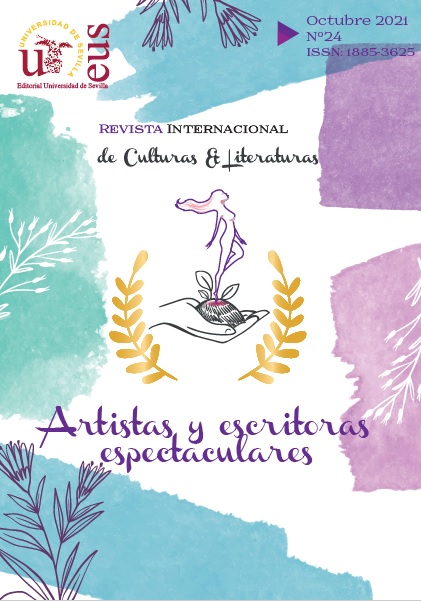ENTRE LENGUAJES: LA POESÍA DIGITAL DE MARÍA MENCÍA
DOI:
https://doi.org/10.12795/RICL2021.i24.06Keywords:
mujer, literatura digital, poesía digital, MultilingüismoAbstract
Women have been present in electronic literature since its beginnings, although as Hayles pointed out, neither their presence nor their contributions have been sufficiently recognized. Therefore, this article focuses on one of the great and first digital poets with the aim of making known one of the women who revolutionized electronic poetry (e-poetry) in the Anglo-Saxon world, the London-based Spaniard María Mencía. We will show how his work is characterized by the study of language and the importance of multilingualism. To this end, three of his most representative works will be presented below, namely: Birds Singing Other Birds’ Song (2001), The Poem that Crossed the Atlantic (2015) and her last work, Invisibles Voices: Women Victims of the Colombian Conflict. The process of creation, the contribution of each of these works to the field of digital literature will be explained, in particular the importance he gives to his work as transnational and multilingual. Finally, it will summarize the most important aspects of María Mencía's poetics, how she began his work focusing on the materiality of language and how it has evolved to become more multilingualism and socially engaged.
Downloads
References
Bolter, Jay David y Grusin, Richard. (1999). Remediation. Understanding New Media. MIT Press.
Di Rosario, Giovanna. (2011). Electronic Poetry. Understanding Poetry in the Digital Environment. Universidad de Jyväskylä. Tesis doctoral.
Doménech I Masià, Oreto. (2015). Poesía digital. Deena Larsen y Stephanie Strickland. Publicacions de la Universidad de Valencia.
Florenchie, Amélie. (2019). Una memoria poética y digital del exilio republicano en el Winnipeg, barco para la esperanza de María Mencía. En Retornos del exilio republicano español: dilemas, experiencias y legados (pp. 117–133). Gobierno de España, Ministerio de Justicia.
Flores, Leonardo. (2019, March 17). "Birds Singing Other Birds' Songs" by María Mencia. I. http://iloveepoetry.org/?p=506#more-506.
Gómez, Verónica. (2018). Literatura y tecnología: cuatro reuniones de mujeres en acción en #WomenTechLit. Rassegna Iberistica, (109). https://doi.org/10.30687/ri/2037-6588/2018/109/009.
Hayles, N. Katherine. et al. (2006, October). Electronic Literature Collection Volume One. https://collection.eliterature.org/1/.
Hayles, K. (2008). Electronic Literature: New Horizons for the Literary. University of Notre Dame.
Luesebrink, Marjorie, (2014). Electronic Literature Organization. En M. Ryan et al. (Ed.), The Johns Hopkins Guide to Digital Media (pp.174-178). The Johns Hopkins University Press.
Mark Otto, J. T. (2020). Invisible Voices: Women Victims of the Colombian Conflict by María Mencía. ELO (un) continuity a Virtual Exhibition. https://projects.cah.ucf.edu/mediaartsexhibits/uncontinuity/Mencia/mencia.html.
Martín Villarreal, Juan Pedro. (2020). Enseñar literatura digital y memoria histórica en el aula ELE a partir de El poema que cruzó el Atlántico (2019) de María Mencía. MATLIT: Materialidades Da Literatura, 8(1), 149-166. https://doi.org/10.14195/2182-8830_8-1_8.
Mencía, María (2017). El Winnipeg, el barco de la esperanza. The Boat of Hope. http://winnipeg.mariamencia.com/?lang=es#winnipeg.
Mencía, María. (2017). #WomenTechLit. West Virginia University Press.
Mencía, María. (2018). Birds Singing Other Birds Songs. En Judy Malloy Authoring Electronic Literature. Julio. https://www.narrabase.net/elit_software.html.
Mencía, María. (2019). Maria Mencia. https://www.mariamencia.com/index.html.
Mencía, María. (2020). InvisibleWomenVoices/MujeresVocesInvisibles. https://www.voces-invisibles.com/.
Mencía, M. (2020). Multimodal Textualities: Poetic Aesthetic Digital Space. Romance Notes 60(1), 179-186. doi:10.1353/rmc.2020.0019.
Meza, N. (2019). Vozes e figuras: por uma retórica digital das obras de literatura eletrônica latino-americanas. Texto Digital, 15(1), 39–65. https://doi.org/10.5007/1807-9288.2019v15n1p39.
Naji, Jeneen, GanaKumaran Subramaniam y Goodith White. (2019). New Approaches to Literature for Language Learning. Palgrave Macmillan.
Pold, Soren Bro., María Mencía y Manuel Portela. (2018). Electronic Literature Translation: Translation as Process, Experience and Mediation. Electronic Book Review. https://doi.org/10.7273/wa3v-ab22.
Rettberg, S. (2019). Electronic literature. Polity Press.
Saum-Pascual, Alex. (2017). Teaching Electronic Literature as Digital Humanities: A Proposal. Digital Humanities Quarterly, V.11, N. 3. http://www.digitalhumanities.org/dhq/vol/11/3/000314/000314.html.

